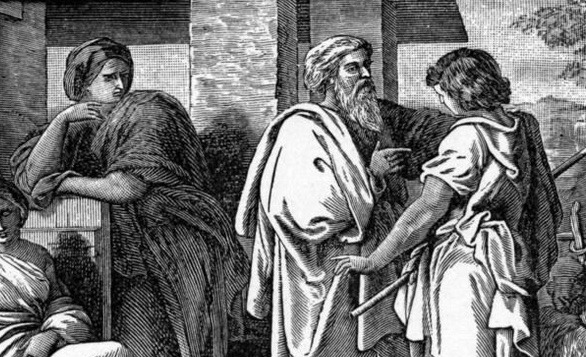 One law in the Torah that makes modern readers shudder is that of the punishment of the rebellious son:
One law in the Torah that makes modern readers shudder is that of the punishment of the rebellious son:
If a man has a stubborn and rebellious son who will not obey the voice of his father or the voice of his mother, and, though they discipline him, will not listen to them, then his father and his mother shall take hold of him and bring him out to the elders of his city at the gate of the place where he lives, and they shall say to the elders of his city, “This our son is stubborn and rebellious; he will not obey our voice; he is a glutton and a drunkard.” Then all the men of the city shall stone him to death with stones. (Deut. 21:18-21)
Even though this law sounds extreme, in a family-centered tribal culture where respect for parents and elders was the cornerstone of order, insubordination to their authority threatened the stability of society. It had to be taken very seriously by the community.
Jewish scholars have traditionally interpreted this law as for rhetorical purposes only, as a hypothetical punishment to strengthen parental authority. As they saw it, the law wasn’t actually meant to be applied. In order to ensure this, rabbinic law added an absurdly long list of conditions to be met, so that it was impossible to enforce. 1
A Progressive Law?
A Bible professor from Uganda shared a fascinating comment about this law — that it sounds shockingly progressive where she comes from. In traditional African society, the father sets the rules for his house and punishes with absolute authority. He has life-or-death power over his children. A wife cannot protest. In these very patriarchal societies, women have no say in the discipline of children by their father.
Yet this law in the Torah stipulates that the mother was one of the ones to be obeyed, and that she also should have a say in deciding the guilt of a child. In some parts of Africa this law would seem shockingly liberal and nearly impossible to implement, the Ugandan scholar commented.

Other scholarly commentaries agree that while this law supports parental authority, it does so by taking it away from the patriarch. Look again at the passage in Deuteronomy 21. Notice that the father doesn’t get to make the decision regarding a son. First, the wife must agree to press charges. Then, the elders of the city are the ones who finally make the decision. All of these restrictions sought to limit the otherwise cruel punishment of a hot-headed father.
The law mitigates punishment by bringing it to the village elders, and away from the emotions of the moment. Yet it doesn’t excuse a defiant teenager who has brought great exasperation to his parents. It allows the community to enforce parental authority when behavior is truly egregious.
A Similar-Sounding Law
Is this seemingly harsh law really intended for such a benevolent purpose? Well, it resembles another law in the Torah with this intent — that of accidental manslaughter (Number 35:6-28). In the Ancient Near East (ANE), when a death occurred at the hands of another, the victim’s “kinsman redeemer” was duty-bound to avenge the death by killing the murderer. This was true even if an accident occurred, like dropping an axe on someone while building a house. Whether or not it was intentional was not a consideration, only repaying life for life.

The Torah, however, stipulated that Cities of Refuge must be set up where manslayers could seek a fair trial, away from the angry family. Only if there was malicious intent could the perpetrator be put to death.
In this law too, the Torah insisted on separating the person on trial from the ones who would punish out of vengeance. Again, the Torah was working within the harsh reality of the ancient world to bring justice. It didn’t outlaw the kinsman-redeemer system overall, but put limits on it so that justice could be done.
The Torah Pushes Back
Bible readers often are told to assume that the harsh social realities of the Ancient Near East and Greco-Roman world applied to Israel. But here the Torah was protesting against the absolute authority given to the father and putting the mother on an equal level with him. This is very surprising!
Later in Scripture we also find many sayings that admonish children to revere and obey both father and mother, not just the father alone.
My son, keep your father’s commandment, and forsake not your mother’s teaching. Prov. 6:20 (Literally, “the torah of the mother”)
Honor your father and your mother, that your days may be long in the land that the LORD your God is giving you. Ex. 20:12
The Torah was often responding to the reality of the day and reforming it. If Israel followed even a minority of the laws that God gave in the Torah, the nation would have been a model of wisdom and justice to the surrounding peoples.
You’re not the Bible’s only Audience
Most Christians find it surprising to look at the Law of the Rebellious Son as progressive, not realizing that that God was likely speaking into the harsh authority of a patriarchal society to put limits on it.
You might think that this was a live issue only in ancient times, but the African scholar pointed out that this situation still exists in traditional cultures even now. The Torah has great wisdom, but its message is sometimes intended for others. We open the Bible’s pages and wring our hands at its pronouncements, but throughout history (and even today) there have been realities that need to be addressed and changed.
We need to realize that we’re not the only intended readers of Scripture. God has loved people in many different times and places, and has sought to teach all peoples, not just us.
~~~~~
1According to rabbinic law, the only time this law applies is for the first three months after he turns thirteen, and only if he has ravenously eaten semi-cooked meat and drunk partially mixed wine, in the company of a group that does not include one decent person, and not on a religious occasion; paying for the food with money misappropriated from his father; only if both parents are living and are not deaf, mute, blind, lame, or maimed in the hand; and only if both agree to prosecute him. Mishnah, Sanhedrin 8:1-4 (from JPS Deuteronomy, Jeffrey Tigay).
(Images – BradLightYear, Wikipedia)
Richard Lugg says
Great article, very enlightening. Thank you.
Ann Spangler says
What an eye opener this is! Thank you, Lois, for your always careful research and fascinating commentary.
Lois Tverberg says
Thanks, Ann 🙂
Bernard Joy says
I have always thought that when we read our Bible, at the end of each story, there is a moment, where we are poked in the chest and asked, “And you, what do you say?” And by our response we are judged.
Don J McLean says
A very insightful article. The intent of ensuring the wife is included seems to me to line up also with the intent of Genesis 2:24. In each of the passages you mention the parents are acting as לבשׂר אחד (basar echad – one flesh) as G-D intended.
Chuck Weyh says
Thank you!
I am always grateful for input from different angles to help me round out and understand DIFFICULT passages in our Bible. With Lois, the “different angles” always end up in place, enriching the text instead of contradicting it or simply adding more question marks.